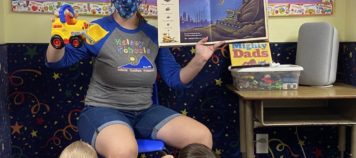We all know children can be taught to throw a ball, sing a song, learn a rhyme, read and write, but can they be taught and guided to develop the qualities of character that are valued by their families and communities? Absolutely! Through guidance and modeling by caring parents, teachers and other adults, children learn to be honest and thoughtful, to stand up for their principles, to care about others, to act responsibly and to make sound moral choices.
Character is a set of qualities, or values, that shape our thoughts, actions, reactions and feelings. People with strong character
- show compassion,
- are honest and fair,
- display self-discipline in setting and meeting goals,
- make good judgments,
- show respect to others,
- show courage in standing up for beliefs,
- have a strong sense of responsibility,
- are good citizens who are concerned for their community, and
- maintain self-respect.
Babies may begin to cry when they hear other sounds of crying, and coo and laugh when they hear others making happy sounds. By the age of three, many children will make an effort to hug or comfort another child or a parent who seems upset. As children grow, compassion can guide their actions and behaviors in positive ways. They understand that by doing something wrong, they cause others pain or unhappiness.
How to help your child be compassionate
We can promote compassion by helping our children think about how others feel. For example, if your child says or does something hurtful to another child, help him to focus his attention on the feelings of the other child by saying kindly, “How do you think Zack feels? Would you like to feel like that?” Children develop compassion by practicing acts of caring and kindness towards others. As adults, we need to emphasize the importance of helping others, giving others the benefit of the doubt and being open to differences.
What You Can Do to help your child
- Talk about the point of view of others as you watch TV, read books or discuss other people with your child. For example, ask, “What do you think that character is feeling and thinking?”
- Be compassionate and show empathy yourself; show care toward others, such as doing errands for sick neighbors or opening doors for others.
- Give others the benefit of the doubt. If your child is upset that another child took her toy. Explain that sometimes younger children don’t do things to deliberately hurt someone or make someone angry. Sometimes they just don’t understand that it’s not o.k. yet.
- Be open to differences. If your child says “Our new neighbors dress funny,” explain that people often wear clothes that reflect their cultures or native countries.
- Get and care for a pet. Any pet will do. Or help take care of a neighbor’s pet.
- Ms. Nancy - March 29, 2024
- Happy Times April 2024 - March 25, 2024
- Parachute Play – Try it at home - March 12, 2024





